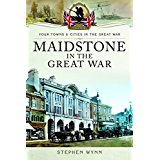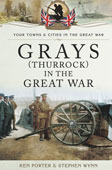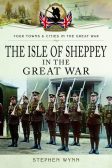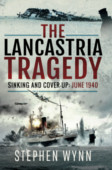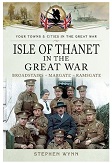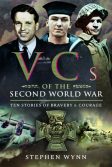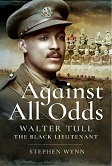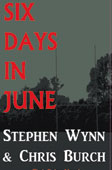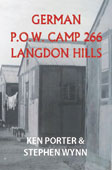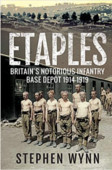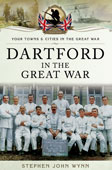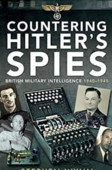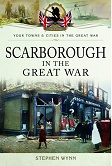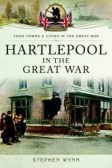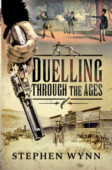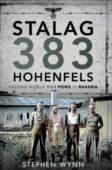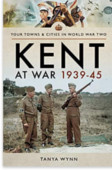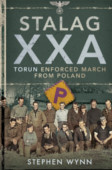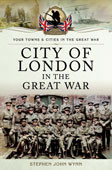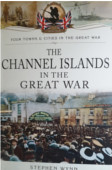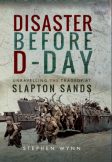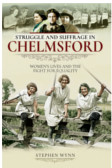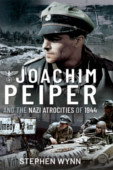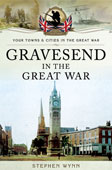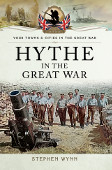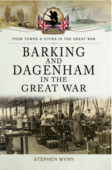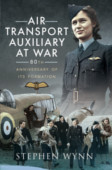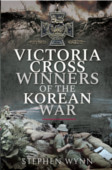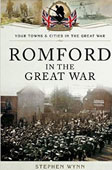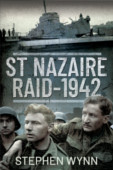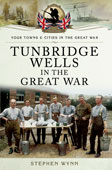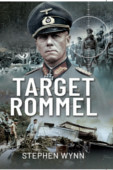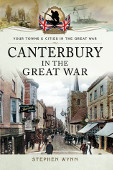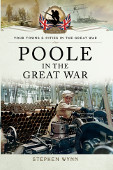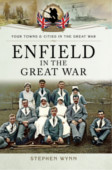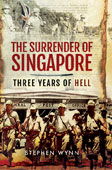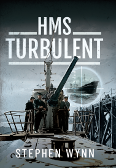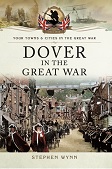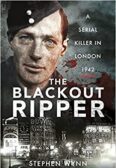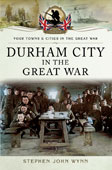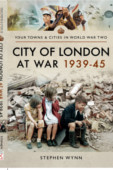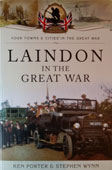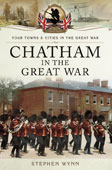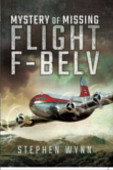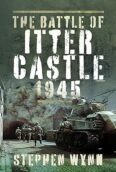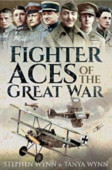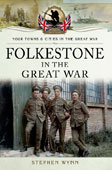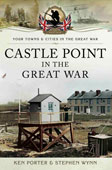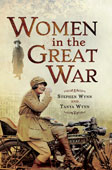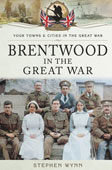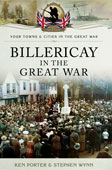My books
This section contains the details of all of my books and a bit of background and insight into them. Enjoy!
Maidstone in the Great War tells the remarkable story of this Kent county town’s immense contribution to the Great War effort from the outbreak of war in 1914, to the long-awaited Allied victory in 1918.
More about the book…
Grays (Thurrock) in the Great War tells the story of Grays and the wider Thurrock area from the outbreak of the Great War until the peace of 1918.
More about the book…
The Isle of Sheppey, although not a heavily populated area, played an extremely important part in Great Britain’s war effort on the home front throughout the four and a half years of the First World War.
More about the book…
The question is, how did a once great nation that built an empire lose it all? From the Meiji Restoration in 1868, restoring Imperial rule under Emperor Meiji, until Japan’s surrender at the end of the Second World War in 1945, the dream lasted a comparatively short period of time: seventy-seven years from beginning to end.
More about the book…
The story behind the sinking of the Lancastria comes in two parts: the sinking of the ship itself and the people who died, and the aftermath which led to allegations of a government cover up ordered by Winston Churchill. There is an ‘officially accepted’ list of those who died, but allegations that hundreds more went down with the ship, and have not been accounted for, still linger to this very day.
More about the book…
Because of the geographical location of the Isle of Thanet, it was always going to play a part in the First World War.
More about the book…
During the Second World War, the Victoria Cross – the highest honour to be given to British or Commonwealth forces – was awarded on 182 occasions to 181 recipients, 85 of which were bestowed posthumously.
More about the book…
Walter Tull would have been a remarkable individual no matter when he had been born, but to achieve what he did, during the time that he did, makes him even more remarkable.
More about the book…
A woman is raped by someone she knows, but decides not to report the matter to the Police mainly because the man threatens to kill both her and her son if she does. Twelve years later the son dies in mysterious circumstances and the Police are unable to establish the cause of death.
More about the book…
Winston Churchill is undoubtedly one of the most respected and best-loved characters the nation has ever known. However, much of how people view him is based on his leadership during the bleak and dire times of the Second World War.
More about the book…
A man loses his wife, his daughter and unborn child in a road accident that involves a speeding motorist. Years later as the man is fast approaching retirement he realizes that he cannot face the twilight years of his life without the love of his life.
More about the book…
This book isn’t a story it’s an historical account of what life was like for the German POW’s who spent time incarcerated in Camp 266 at Langdon Hills in Essex.
More about the book…
During the First World War, Etaples, a coastal fishing port situated on the North-East French coast, 15 miles south of Boulogne, was a base camp for the British Army, as well as a major medical facility for wounded and sick troops, including both British and Canadian hospitals.
More about the book…
When soldiers go to war, what do their families and friends experience? There is huge public support for the military, who risk their lives in faraway war zones, but do we really have any idea what their ‘nearest and dearest’ go through while the troops are away?
More about the book…
Dartford was a hive of activity during the Great War years, with most in the community doing their bit for the war effort in what ever way that they could.
More about the book…
When the military aspect of the Second World War is discussed, especially regarding how the war was won, people tend to talk about, Winston Churchill, D-Day, Dunkirk, the Battle of Britain, the Blitz, the Dam Busters, the Allied bombing of German cities, Montgomery and the North Africa campaign, etc.
More about the book…
In the early months of the war, for most people Scarborough was just another town somewhere in northern England, where exactly, they weren’t entirely sure.
More about the book…
With the outbreak of the First World War, it was not surprising that a number of individuals who were of German decent, and who lived in Hartlepool and its surrounding areas, were rounded up and detained by the British military authorities, in the interests of both national security and for their own personal safety.
More about the book…
Putting aside Roman gladiators and gun-slingers of the American Wild West, by the 19th century duelling had become the sole domain of nobility, military officers and gentleman, with rules added to make sure everything was conducted in a fair and professional manner.
More about the book…
Stalag 383 was somewhat unique as a Second World War prisoner of war camp. Located in a high valley surrounded by dense woodland and hills in Hofenfels, Bavaria, it began life in 1938 as a training ground for the German Army.
More about the book…
Kent at War 1939 – 45 is a comprehensive account of the part that the county played in the Second World War, covering in great detail a combination of life on the home front from a civilian perspective balanced against that of a military one.
More about the book…
Stalag XXA was a Second World War German POW camp for non-commissioned officers located in Nazi occupied Torun, in northern Poland.
More about the book…
The Shetland Bus was not a bus, but the nickname of a special operations group that set up a route across the North Sea between Norway and the Shetland Islands, north-east of mainland Scotland.
More about the book…
A History of the Royal Hospital Chelsea looks at the hospital’s beginnings, with its Royal patronage and heritage which dates back to King Charles ll in 1682\.
More about the book…
Throughout the First World War, London played a major part in Great Britain’s war effort, both at home and abroad. A far as Germany was concerned, the city was their ultimate goal – the ultimate target that would bring them the sought-after victory they so desired.
More about the book…
Before the outbreak of the First World War, the Channel Islands were viewed as they are today; scenic, sunny and relaxing holiday destinations, where it was possible to briefly escape from the hustle and bustle of everyday life.
More about the book…
A Second World War prisoner of war camp in rural Essex sees two German POW’s die in mysterious circumstances, their deaths remained unresolved for sixty-five years.
More about the book…
Operation Dynamo, the successful evacuation of Belgian, British, Dutch, French and Polish troops from the beaches at Dunkirk between 27 May and 4 June 1940, was not only a pivotal moment of the war, but one that changed its final outcome.
More about the book…
An armed robbery takes place at a Supermarket which results in the unintentional death of a security guard. Only one member of the gang who carried out the robbery stands trial for both the robbery and the murder of the guard.
More about the book…
This is a book of two stories. The first is the sad tale of how at least 749 American servicemen lost their lives on a pre-D-Day landing exercise, code-named ‘Operation Tiger’, on the evening of 23/24 April 1943. The second, was the unanswerable question of whether the attacking E-Boats of the German Kriegsmarine had fully grasped the importance of what they had stumbled across.
More about the book…
Struggle and Suffrage in Chelmsford is a comprehensive account of what life was like for women in Chelmsford from 1850-1950.
More about the book…
Joachim Peiper held the rank of Obersturmbannfuhrer in Nazi Germany’s fanatical Schutzstaffel, more commonly referred to as the SS.
More about the book…
Gravesend was like most other towns in the UK during the course of the First World War. When the call came to serve King and Country, local men enlisted in their thousands, but sadly not all of them returned.
More about the book…
Hythe in the Great War looks at the military aspect of the war from the town’s perspective, including how many men from the town became casualties and the knock on effect this had on their families.
More about the book…
The First World War was only a matter of days old when Barking placed itself firmly on the map, after Driver Job Henry Charles Drain of the 37th Battery, Royal Field Artillery, was awarded the Victoria Cross.
More about the book…
The first Allied bombing raid on Berlin during the course of the Second World War, took place on 7 June 1940, when a French naval aircraft dropped 8 bombs on the German capital, but the first British raid on German soil took place on the night of 10/11 May 1940, when RAF aircraft attacked Dortmund.
More about the book…
Animals in the Great War looks at the use of animals by all sides in the Great War and to what effect. In the main, it focuses greatly on horses, dogs and pigeons but also addresses the war efforts of other animals.
More about the book…
This book looks at the invaluable work carried out by members of the Air Transport Auxiliary during the course of the Second World War.
More about the book…
The Korean War (1950-53) is often referred to by many British and Commonwealth veterans who took part in it as the ‘forgotten war’, a reference which does not include themselves or the families and friends of those who were killed.
More about the book…
Romford in the Great War tells the remarkable story of Romford and its surrounding areas from the outbreak of the Great War in 1914, to the long-awaited peace of 1918.
More about the book…
The raid on St Nazaire has gone down in history as one of the most daring commando raids of all time.
More about the book…
Using original material and letters from the First World War, this captivating and eye-opening account uncovers the unnerving realities of the First World War and the impact it had on the town of Tunbridge Wells.
More about the book…
From a German perspective, the highly decorated and well respected General Erwin Rommel was one of their biggest and brightest assets: a military strategist who thought outside of the box’, a tactic which more than once either brought him an unexpected victory, or saved him from almost certain defeat.
More about the book…
Canterbury had been a garrison town for many years before the war, and when hostilities began between Britain and Germany, it was home to The Buffs (East Kent Regiment).
More about the book…
On 13 August, with the war only a matter of days old, the German cargo vessel, Herbert Fischer, was on its way from Russia to deliver timber to J T Sydenhams in Poole.
More about the book…
The Royal Small Arms Factory in Enfield was famous for producing the Lee Enfield .303 Rifle, the standard issued rifle provided to all infantry soldiers in the British Army during the course of the First World War.
More about the book…
Until the late 1930s, Singapore was noted as a popular stop-off point for wealthy European travellers on their way to countries such as Australia and New Zealand. All of that changed with the outbreak of the Second World War.
More about the book…
HMS Turbulent was a Royal Navy T-class submarine. From its launch in May 1941 to when it was lost at sea, along with its entire crew, in March 1943, it was responsible for the sinking of nearly 100,000 tons of enemy shipping.
More about the book…
The Holocaust is without doubt one of the most abhorrent and despicable events not only of the Second World War, but of the twentieth century.
More about the book…
Situated on the south coast of England, geographically and strategically, Dover more than played its part in the First World War.
More about the book…
Two days before the outbreak of the Second World War, the British government imposed blackout regulations across the nation as it was believed that in the event of war, Germany would very quickly begin conducting air raids on British towns and cities.
More about the book…
Durham was, and still is, one of the country’s oldest and best-loved cites. The very name was synonymous with dedication, dependability and determination.
More about the book…
The City of London was always going to be an obvious target for German bombers during the Second World War.
More about the book…
Laindon in the Great War is a detailed account of how the war impacted on Laindon and the surrounding district, known today as Basildon, from the outbreak of the Great War in 1914, to the long-awaited peace of 1918.
More about the book…
Chatham played a very important part in the nation’s Great War effort. It was one of the British Royal Navy’s three ‘Manning Ports’, with more than a third of the town’s ships manned by men allocated to the Chatham Division.
More about the book…
On 19 August 1942, an Allied amphibious raid took place on the coastal town of Dieppe in northern France, when a force of some 6,500 infantry soldiers, predominantly Canadian, and supported by a number of tanks were landed by ships of the Royal Navy under a blanket of cover provided by the RAF.
More about the book…
Following the Geneva Accords in 1954, Vietnam found itself separated into North and South, with communist North Vietnam under the control of Ho Chi Min.
More about the book…
The Battle of Itter Castle was undoubtedly one of the strangest events of the Second World War, being one of only two occasions during the war in which Americans and Germans fought side by side.
More about the book…
History has recorded that the first ever powered flight took place at Kitty Hawk in America, on 17 December 1903 and was carried out by the Wright brothers, Orville and Wilbur, who were aircraft designers and manufacturers.
More about the book…
Folkestone became one of the most important British towns during the First World War. Through its harbour, an estimated 10 million troops and nurses either departed from or arrived back in England between 1914 and 1919.
More about the book…
Brief history on the various parishes that make up the Borough of Castle Point and what life was like prior to 1915.
More about the book…
The First World War was fought on two fronts. In a military sense it was fought on the battlefields throughout Europe, the Gallipoli peninsular and other such theatres of war, but on the Home Front it was the arduous efforts of women that kept the country running.
More about the book…
Brentwood in the Great War tells the remarkable story of Brentwood and its surrounding areas from the outbreak of the Great War, to the long-awaited the peace of 1918.
More about the book…
In 1914 Billericay was a peaceful compact village of about 2000 inhabitants. There was the High Street, Back Street, which today is called Chapel Street, and Back Lane which is now Western Road.
More about the book…



